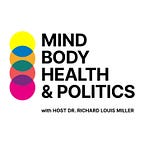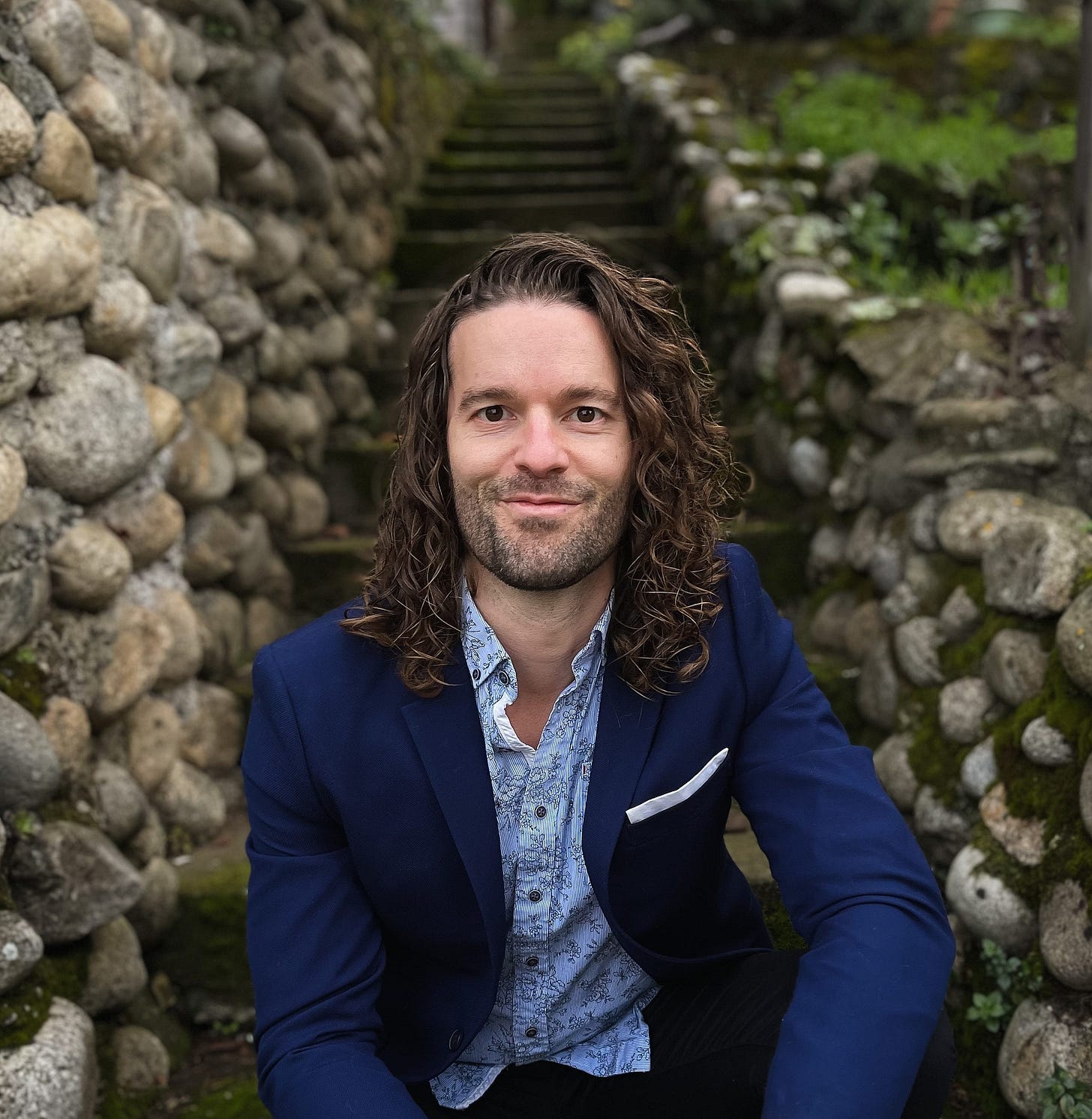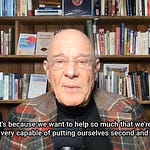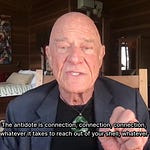Dear listeners,
I’m delighted to share my recent discussion with clinical psychologist Dr. Heath Schechinger, who is doing breakthrough work in the emerging area of so-called “consensual non-monogamy,” aka polyamory.
Heath sheds light on realities beyond traditional two-partner relationships. Many face tensions between desiring security with a partner and craving novelty and expansion. Heath explores how consensual non-monogamy can create space to ethically navigate these dual desires.
Rather than seeing differences as deficient, Heath calls us to approach diverse relationship orientations with openness. He traces society's progression in accepting interracial relationships, same-sex relationships, and more. We must extend that same neutral curiosity to exploring consensual non-monogamy.
Heath dives into the logistics of how polyamory functions day-to-day. Most common is separate relationships with agreements to date others. He notes practical limits on the number of partners one can truly sustain. Navigating jealousy comes down to honoring agreements and mutual care for each partner's needs.
Beyond just sex, Heath emphasizes the ethics of honoring commitments. Deception erodes integrity and trust, whereas open communication allows us to navigate desires compassionately. Heath sees consensual non-monogamy as bringing light to attractions we commonly deny, enabling more authentic relating.
I found Heath to be thoughtful, pragmatic and solutions-oriented - a pioneer lighting the way for others. Tune into our conversation as we unpack assumptions about relationships and reflect on what it means to live fully, ethically and with an open heart.
Golden light,
Dr. Richard L. Miller
Watch:
Show notes:
Introductions and defining consensual non-monogamy (00:00 - 07:22)
Heath provides an overview of consensual non-monogamy and its various forms - polyamory, swinging/the lifestyle, monogamish
Discusses the difference between polyamory's focus on love/relationships vs swinging's focus on sex
Exploring cultural acceptance and the “differences vs deficient” mindset (06:11 - 15:27)
They discuss the importance of accepting differences as neutral rather than deficient
Heath talks about the cultural progression in accepting interracial relationships, same-sex relationships, etc.
Notes that differences in relationship orientation should be explored from a neutral stance
The realities and logistics of polyamorous relationships (17:19 - 37:16)
Richard asks about how polyamory works logistically - living together, rotating partners, dealing with jealousy
Heath shares that most common is separate relationships with agreements to date others
Notes practical limitations on number of partners due to time/resources
Bisexuality and polyamory (38:27 - 41:27)
Richard notes bisexuality seems advantageous in polyamory situations
Heath confirms bisexual people are drawn to polyamory relationships
Polyamory and raising children (42:10 - 45:35)
Discusses how children in polyamory families seem to fare as well as other family structures
Challenges include custody disputes and legal discrimination
The politics and psychology of polyamory (45:59 - 55:57)
Heath provides background on his leadership in the APA's Division 44 committee on consensual non-monogamy
Discusses the growing acceptance and latent interest in non-monogamy
Sees parallels to LGBTQ rights movement struggles and progress
Pull towards “normal” in relationships (53:03 - 58:40)
Richard notes the conflict between accepting differences and striving for “normal”
Heath sees an assimilation process as needed initially to show similarities before embracing differences
Believes the non-monogamy movement needs safety before people will “come out”
Non-monogamy and infidelity (59:57 - 1:06:42)
They discuss cheating not as a sexual act but as breaking one's word
Heath notes non-monogamy tries to bring ethics into dealing with attraction to others
Food politics - organic, health, and environment (1:08:48 - 1:09:12)
Richard describes his changing views on the need to eat organic after researching the health impacts
Heath notes the environmental benefits still compel him
Financial logistics of polyamory (1:12:00 - 1:15:39)
Heath says finances in polyamory are negotiated like other shared living situations
Notes the economic practicality of sharing expenses across more incomes
Architecture and social structures (1:15:25 - 1:17:38)
Richard and Heath discuss Paolo Soleri's Arcosanti project and shared living spaces
Challenge of finding affordable flexible architectures to enable diverse living arrangements
Links and references:
https://www.drheathschechinger.com/
American Psychological Association (APA) - apa.org
Seeking Psychedelic Testimonials: The Good, the Bad, and the Ugly.
We are currently looking for first-hand accounts of adverse effects of psychedelics—from ‘bad trips,’ to unwanted physiological complications, to abusive practices by guides, therapists, and shamans.
The interviews from this series will go into a forthcoming book on the topic—perhaps the first book its kind.
Please contact me if you would like to be interviewed.
Transcript
Dr. Richard L. Miller: Today on mind, body health and politics, I'm delighted to have with us Dr. Heath Schechinger. He is a clinical psychologist. And he is also someone who is doing pioneering breakthrough work in an area that many of you might be very unfamiliar with. It goes by the president name of consensual non monogamy, we're gonna find out what this means. And a lot more welcome to Mind Body health and politics. Hea
th.
Heath Schechinger 6:08
Hey, thank you, Richard. It's an honor to be here.
Dr. Richard Miller 6:11
To begin with, I have difficulty with groups that define themselves in terms of what they're not. For example, there's a group in philosophy called "non-dual." While I agree with their concept of unity and rejection of Cartesian dualism, their name is still odd. It's like someone saying their religion is "non-Catholic," but not specifying what they actually believe in.
Similarly, I have an issue with the term "consensual non-monogamy." It would be helpful to have a term that describes the actual nature of the relationship, rather than what it is not.
Moving on, could you outline various forms of cohabitation beyond traditional monogamy?
Heath Schechinger 7:22
Sure. So under the term consensual non monogamy and I agree with you and most people do even people within the space and having these discussions and anticipate that that.
Consensual non-monogamy encompasses many different forms of relationships where consenting adults are involved in more than one romantic or sexual connection with others. Some of the subtypes include polyamory, swinging, and monogamish, although not everyone agrees on these terms. Polyamory is focused on having agreements that allow for both sex and falling in love with multiple people. Swinging, on the other hand, tends to be more heterosexual and focused on having sexual experiences with others, with agreements that limit falling in love. Monogamish is a predominantly monogamous couple, with occasional sensual or sexual connections with a friend.
Polyamory is sometimes confused with polygamy, which is more rooted in religious fundamentalism, such as the Mormon church, and involves having multiple wedded spouses. The emphasis is on marriage in that context.
Dr. Richard Miller 10:13
Now, in the, in all of these, these sections is a big factor, sexual aspect of the relationship. But in polyamory, and I'm going slowly as a way of saying, I'm asking you to clarify, in polyamory, the distinction with it from the other groups, is that in polyamory, there's an actual relationship amongst the people that is beyond the sexual relationship. Whereas in the other groups you described, it sounds like, what's different? Is there sex with other people, but there isn't an ongoing, what you might say, amorous of a romantic relationship? Is that correct?













